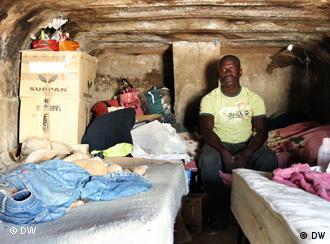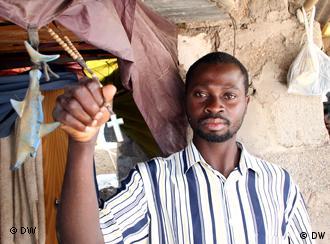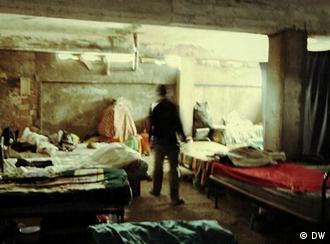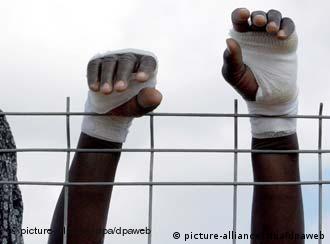Life on the less than sunny side of Spain
The agricultural region around Spain's Almería is home to thousands of illegal immigrants living in slum-like conditions. Amid the economic crisis, many want to return to Africa, but lack the means to get home.

When the sun shines, Isaak's home turns into an oven. The 30-year-old, who came to Spain from Ghana, sits on a mattress and knocks on the roof of his shelter.
"That's metal - in the summer you can burn your finger on it," he told Deutsche Welle.
The shelter is made from an upside down cargo hold of a truck, and is too low to stand up in. Nonetheless Isaak shares it with four other African immigrants.
Rust has eaten away at the metal in some places, so that when it rains, the water drips inside.

Isaak's home
Each man has his own mattress. Isaak keeps his possessions, which consist of clothing, a bible, toiletries and a photo of his family back in Ghana, in plastic and cloth bags. Next to his bed is a bag of groceries from the Red Cross.
"I don't have any work, so it's almost impossible to find anything at the moment," he said.
Isaak's shelter is located amid a sea of greenhouses in San Isidro near Almería. The region, located in Spain's rural southeast, is known as "Europe's greenhouse." Huge stretches of land are covered with sheets of plastic, making the area look like a giant mirror in satellite images.
The greenhouses are used to grow peppers, zucchini, tomatoes and melons, and the produce cultivated in the region is delivered to supermarkets across Europe.
Most of the harvest workers come from Africa and Eastern Europe. Few Spaniards choose to work here, due to the hard conditions: Temperatures inside the greenhouses can reach 50 degrees Celsius during the summer.

Accommodation of illegal immigrants in Nijar, southern Spain
Most Africans living in the Níjar area came to Spain on a "patera," a crowded boat that ferries refugees across the Mediterranean. Isaak started his 1,120 euro ($1,500) trip in Mauretania.
After several days the vessel reached the Canary Islands, where Isaak was detained by police and issued a deportation order. But instead of being sent back to Africa, he was flown to the Spanish mainland.
The story is similar for many other migrants; very few of whom were actually flown back to their home countries.
No papers, poor conditions
Isaak was not unhappy with his life in Ghana, where he worked as a cobbler. But one of his friends wooed him with stories of getting rich in Europe. And despite his mother's objections, Isaak was determined to give it a try.
Ultimately, he didn't find the material wealth he was looking for - and since then, life has been a vicious circle.
"The problem is that I don't have any papers," Isaak said. "Without papers, there's no decent apartment, and without papers there's no work."
For illegal immigrants like Isaak, getting the necessary documents is almost impossible. María del Mar Castillo, from the organization Almería Acoge, said the Spanish authorities have made the process tougher in recent years.
Almería Acoge helps with these formalities, and operates several centers where immigrants can shower, use the toilet and wash their clothes.

Migrants flock to souther Europe, seldom knowing that awaits them when they arrive
With poor prospects for getting documents and work, many immigrants have grown desperate. For some, the waiting has gone on for years, and an increasing number of them suffer from depression.
"For the past several months, we've seen an increase in the number of migrants who want to go home voluntarily," María del Mar Castillo said. "That's a new development."
For many, returning home without money in the bank is tantamount to admitting defeat, not least because oftentimes their families had to run up debts in order to pay for the trip to Europe in the first place.
Even those who want to go home often can't, because they lack the money for a plane ticket. Spanish authorities have allocated only a small amount of money to fund travel for voluntary deportees.
As a result, many African immigrants in Níjar feel as if they are living in a prison. But they continue to send positive reports to their families back home, leading them to believe that things are going well.
Author: Steffen Leidel / arp
Editor: Sam Edmonds
Editor: Sam Edmonds

No comments:
Post a Comment